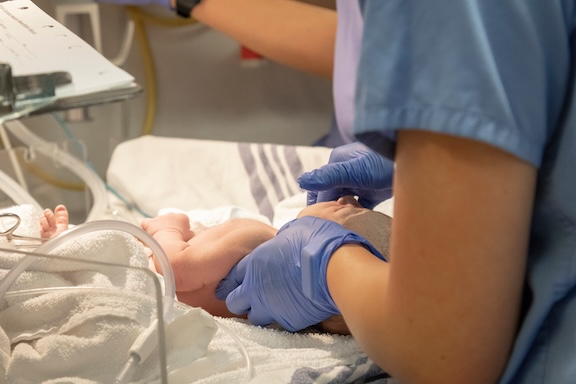Treatments to help babies who run out of oxygen during pregnancy or at birth (neonatal encephalopathy) are limited. Therapeutic hypothermia is the only option used to prevent brain damage in such cases, but 29 per cent of babies who receive it still develop significant neurological sequelae. The first phase of a new clinical study conducted at the Montreal Children’s Hospital (MCH) shows that the administration of sildenafil, marketed under the brand name Viagra, could be a possible solution.
This is the first proof-of-concept study to attempt to repair the brain damage caused by neonatal encephalopathy. In general, research focuses on how to prevent it. The results indicate that the use of sildenafil in babies who have developed such sequelae despite therapeutic hypothermia is feasible and safe. This first phase also shows encouraging signs of efficacy, and research will be continuing in this area.
“Currently, when a baby has brain damage, there is little we can offer other than supportive care such as physiotherapy, occupational therapy or specialized care. If we had a drug that could repair the brain, it could change the future of these babies. It would be a victory for them, for their family and for society in general,” explains Dr. Pia Wintermark, senior author of the study, a neonatologist at the MCH and scientist with the Child Health and Human Development Program of the Research Institute of the McGill University Health Centre (RI-MUHC).
Studied for adults
Research in rat models has shown that sildenafil can have neurorestorative properties in adult stroke patients. It was therefore important to know whether this drug could have similar effects on the brains of newborn babies.
The idea came while Dr. Wintermark was doing her residency in Switzerland. She continued her training on how to work with animal models in Boston. Upon her arrival in Montreal, she began her laboratory experiments in 2010.
Between 2016 and 2019, Dr. Wintermark and her team were finally able to proceed with the first phase of the clinical study involving 24 babies born at 36 weeks of gestation or more, with moderate to severe neonatal encephalopathy, who had been placed on therapeutic hypothermia and had brain damage despite treatment. Of the group, eight received sildenafil starting on the second or third day of life, twice a day for seven days (total of 14 doses). A placebo was administered to three other babies.
During the first ten days of the children’s lives, the researchers assessed the safety of the treatment by recording the occurrence of adverse events such as hypotension, worsening liver function, persistent pulmonary hypertension, death, etc.
Blood pressure slightly decreased in two of the eight babies after the first dose of sildenafil, but this did not recur thereafter. One newborn who received the drug died after his family decided to transition to palliative care, a choice parents sometimes make when their child has important brain damage. This event is not considered to be related to the administration of sildenafil. No child in the placebo group died.The study therefore concludes that sildenafil is safe and well absorbed by babies who have developed brain damage due to neonatal encephalopathy and in whom therapeutic hypothermia has proved ineffective.
Signs of recovery
The efficacy of sildenafil was also assessed as an exploratory analysis. At 30 days of age, five newborns treated with sildenafil showed partial healing of injury, fewer signs of brain volume loss and an increase in deep gray matter. Nothing of the kind was noted in the placebo group.
Nine out of 10 patients were also seen at 18 months for neurodevelopmental evaluation. In the sildenafil group, one baby in six developed cerebral palsy, compared to three babies in three in the placebo group. Global developmental and fine motor delays were noted in two out of six children given the drug, while all children in the placebo group (3/3) suffered from them.
“All neonates enrolled in this study had significant brain damage at baseline. As such, it was expected that they would develop poorer neurodevelopmental outcome compared with a general population of neonates with neonatal encephalopathy treated with therapeutic hypothermia,” says Dr. Wintermark.
The first phase of this study was not designed to establish the efficacy of sildenafil in such cases. However, assessments at 30 days and 18 months ruled out any long-term adverse events and showed encouraging results for the future. Further studies will be carried out on larger cohorts of neonates to confirm the phase I findings, define the optimal dose of sildenafil and establish its neuroprotective and neurorestorative potential.
“Sildenafil is inexpensive and easy to administer. If it holds its promise in the next phases of the study, it could change the lives of babies suffering from neonatal encephalopathy all over the world,” concludes the researcher.
The study Feasibility and safety of sildenafil to repair brain injury secondary to birth asphyxia: A randomized, double-blind, placebo-controlled phase Ib clinical trial was conducted by Pia Wintermark, Anie Lapointe, Robin Steinhorn, Emmanouil Rampakakis, Jürgen Burhenne, Andreas D. Meid, Gzona Bajraktari-Sylejmani, May Khairy, Gabriel Altit, Marie-Therese Adamo, Alishia Poccia, Guillaume Gilbert, Christine Saint-Martin, Daniela Toffoli, Julie Vachon, Elizabeth Hailu, Patrick Colin and Walter E. Haefeli.


